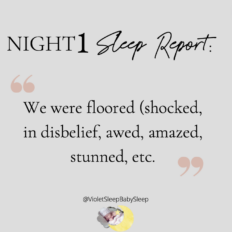6 Month Sleep Regression:
What It Is, Why it’s Happening, and How to Handle It
Is your 6 month old waking every hour?
Just when you thought you’d figured it out … your little one changed it up.
The four-month regression was tough, but you survived it. And not only that, you came out of it with a baby who actually enjoyed sleeping.
You’ve dug yourself out of the newborn fog and feel like a new person. But now your baby is up at night again, and you’re confused.
So it’s back to the drawing board, searching the internet for an explanation while pacing back and forth with your sleepless little one.
It’s called the 6 month sleep regression, and here’s what you need to know.
What Is Sleep Regression?
A sleep regression is an interruption in your baby’s sleep schedule. These regressions are often due to developmental progression. Their brains and bodies are working hard. Some of the signs of sleep regression are:
- shorter naps
- waking up often at night
- extreme fussiness
- fighting sleep
Many believe there is a 6-month sleep regression, though it isn’t as difficult and long as the 4-month sleep regression and doesn’t happen to all babies. If you’re one of the lucky ones with a sleeping baby, do a happy dance and give them a kiss.
Then send some coffee to your bleary-eyed friend whose baby has decided that sleep is an unnecessary luxury.
The changes that your baby is going through are exciting but exhausting. While all their new milestones feel monumental, they can affect your 6 month old’s sleep. And having a baby not sleeping can take some of the joy out of all these new firsts.
6 Month Sleep Regression Signs
One of the most clear signs that your 6-month-old is going through a sleep regression is their refusal to sleep.
There are other hints that your baby might be experiencing a 6-month-regression such as:
- Your baby feels different, but you can’t figure out why.
- Your 6 month old is waking every hour at night.
- It takes more than 20 minutes for your little one to fall asleep at nap time.
- Naps are a lot shorter than they used to be.
- Unless they’re held, your 6-month old is cranky.
If your baby is experiencing any of these symptoms, don’t worry. You’ve already survived one sleep regression. You can definitely survive another one.
Why Is Your 6 Month Old Waking Every Hour?
When a sleep regression occurs, it is usually because your baby is going through a lot of developmental growth. It can also happen because your little one’s sleep needs change. Here are some reasons your 6-month-old is going through a sleep regression:
Developmental Changes
At around six months old, your baby is experiencing many important developmental milestones. These include rolling, sitting, or even crawling. These exciting new skills can overstimulate your little one. This can cause them to be excited and restless, affecting their sleep patterns.
Separation Anxiety
Around 6 months, babies start to know and recognize who their caregivers are. They also begin to be more aware when they’re left alone, or the person they know leaves their sight. This awareness can cause separation anxiety, making it hard for them to settle back down and sleep on their own.
Sleep Associations
Babies may have developed sleep associations with certain habits or objects during this age. Some of these are falling asleep with a pacifier, needing a bottle to sleep or rocking to sleep with a parent. When they wake up between sleep cycles, they might need these associations to fall back asleep, leading to frequent night wakings.
Teething
Teething can begin around six months and cause discomfort or pain as the teeth push through their gums. The pain tends to be more pronounced at night, making it difficult for babies to settle or stay asleep for long periods of time.
Changes in Feeding
As babies grow, their nutritional needs might change. They often need more frequent feeding or more food at each feeding. The introduction of solid foods often happens around this time too. Babies at around six months also are more distracted during feedings which can impact the amount of calories they’re getting in a day. Not having enough to keep them full can cause disruption to their sleep, and hunger will cause them to wake up in the middle of the night.
Overstimulation
As babies grow, they become more aware of their surroundings and explore the world around them with increased curiosity. They are like sponges, soaking up every sound, sight, and touch around them. This type of increased stimulation without enough time to wind down before bed can impact their quality of sleep.
Changes in Sleep Needs
As babies get older, their wake windows need to increase. A wake window is the time a baby should be awake between naps and bedtime. A 6-month-old’s wake window should be between two to three hours. Some little ones around this also transition from three naps to two. If a baby’s wake window is too short, their sleep will also tend to be too short.
How Long Does the 6 Month Sleep Regression Last?
I want to encourage you: your baby will sleep again, and it won’t take long! The 6 month sleep regression usually only lasts about a week. I want to encourage you to stay consistent through this time. Introducing a new routine or changing your habits can cause a much longer struggle in getting your little one to return to good sleep. Check out my tips below on how to survive this sleep regression.
Tips for Surviving the 6 Month Sleep Regression
Here are my tips if your 6-month-old is waking every hour.
Stay active during wake time.
Help your baby stay active and engaged during wake time. Encourage floor time for crawling and rolling. Provide objects that support them as they begin to practice pulling up. Keeping them active during playtime can benefit their sleep. This happens by reducing restlessness during naps and bedtime.
Pay attention to bedtime.
7:00 to 8:00 pm is a good time to go to bed for babies around six months old. Keeping a baby up too late can cause overtiredness and the inability to fall asleep. Your 6 month old should have about 2 hours of awake time before they’re put to bed. Develop a bedtime routine and try to get your little one down around the same time each night.
Stay consistent.
Though giving in when your baby is struggling to sleep may be tempting, try to stay consistent. A regular sleep routine helps your little one recognize bedtime, creating a sense of comfort. By staying consistent, you can help the regression phase to pass more quickly and smoothly.
Begin to increase wake time.
It’s necessary to have productive awake time, so your little one can get good sleep for both naps and nighttime. A 6-month-old should stay awake for 2-3 hours between each sleep and stay active.
Support and reassure your baby.
It’s important to be consistent and stay on a schedule to ensure you’re responsive to their needs. If your baby is teething and needs a little extra cuddling, that’s okay. Also, if your baby wakes up early and seems overly hungry, adjusting the schedule a little is okay. Paying attention to your 6 month old’s cues and making small adjustments can be necessary for creating a sleep routine.
Give it time.
Remember to have patience. Your baby is having a hard time and can’t tell you how they’re feeling. This regression is temporary. By following these guidelines, your baby will get back to sleeping through the night, and you will get to sleep again too.
Ask for help
Sometimes, all the Google searches and educational blogs aren’t enough, and you need extra help navigating this sleep regression.

Is your 6 month old waking every hour after a week of following these tips?
If so, it might be time to ask for help. I provide personalized sleep consultations. I also have a proven track record of assisting families in identifying the causes of 6 month sleep regression. Let’s work together to find a solution that brings peaceful nights back to your home.




















